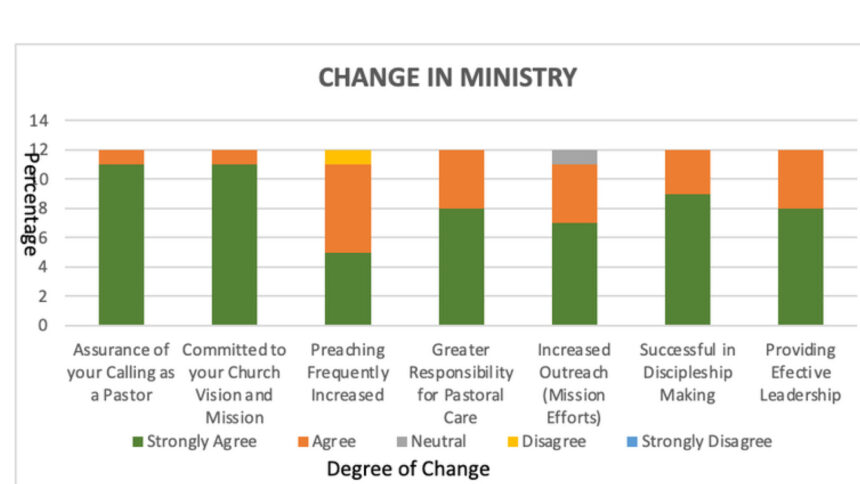The investigation required respondents’ level of agreement after studying ‘Pastoring the Flock of God’ with responses as ‘strongly agree’, ‘agree’, ‘neutral’, ‘disagree’, and ‘strongly disagree’ to indicate the biggest change in their life and ministry. The summary of agreement level on their life’s change after studying PTFG is indicated in Figure above. The figure shows that most pastors scored highest on “assurance of your calling as pastor and committed to your church vision and mission”. This therefore shows that the training helped the pastors gain a stronger understanding of their respective church visions and missions and a full understanding of their calling.
With the mean score out of five, the summary of agreement level on how their lives changed after studying PTFG is shown in the figure above. The figure above shows that most pastors scored highest on “assurance of your calling as pastor and committed to your church vision and mission” This therefore shows that the training helped the pastors gain a stronger understanding of their respective church visions and missions and a full understanding of their calling.
The next highest score “successful in discipleship making” This implies that PTFG sparked a discipleship movement that provided the pastors with a peer learning model from which they benchmarked their discipleship initiative. Prior to PTFG, some respondents said that they didn’t know that there was any need for discipleship, while others thought discipleship was only for the flock. In as far as the pastor is concerned, there was increased preaching engagement before PTFG in their local church. But due to PTFG’s effect, their capacity to effectively preach was built, increasing their burden. Support of other churches increased hence more preaching engagement and increased opportunity for them to preach. The cluster model provided a wider opportunity for collaboration within the churches, creating more opportunities to speak outside their own churches. The indicators on “Greater responsibility for pastoral care” and “providing effective leadership” increased understanding and responsibility of the pastor for their flock. This is illustrated in increased pastoral care programs and individual pastoral engagements to their congregants. This practice is curtailing the pastoral tendency to dominance while lording it over the flock.

